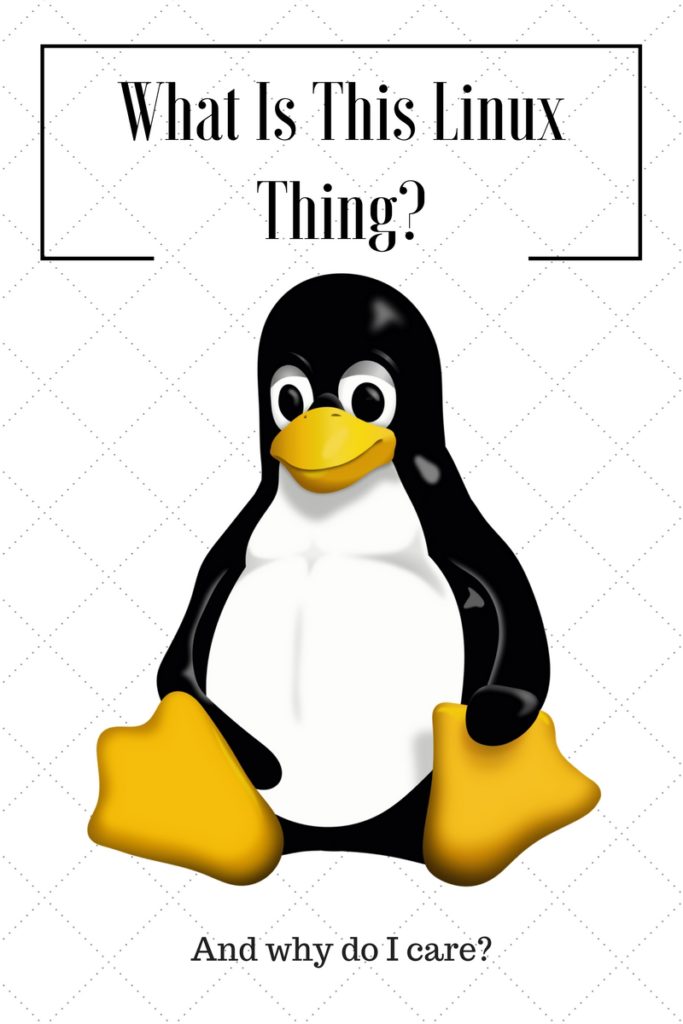
Do you ever get tired of Windows? Even a die-hard Mac user has moments when they want to walk away from their current operating system. Wouldn’t you like to be able to customize your OS the way you want? How about install apps easier? Maybe even increase the performance of your machine? I do. That’s why I use Linux. But you might be wondering…
What Is Linux?
Have you seen this cute little penguin before? He’s becoming more and more popular. Nerds like me have known this guy for years now. His name is Tux. Tux is the official mascot of the Linux Kernel. But even mundanes are taking notice. Why is he becoming noticed by the “normal people,” you may ask? Well, we’ll get into that. First, let’s ask ourselves. What is this Linux thing anyway?
So here’s the part where I can totally bore you all with a ton of geeky facts and details that I personally find fascinating. But I’m not here to scare anybody away. And besides Steph, the other half of The Nerd Garden isn’t here right now to translate Geek.
Right. Linux. What is it? It’s an operating system like Ubuntu, Red Hat, or Debian? Technically no, it isn’t. Linux refers to just the Kernel, just one part of the operating system. The Ubuntus, Red Hats, Debians are actually a set of programs, tools and other sorts of operating system type stuff from the GNU operating system. They use Linux as their kernel. So to be absolutely correct these operating systems are GNU/Linux.
But Linux gets all the hype so everybody just calls them Linux. And we will too from here on out.
What’s A Kernel?
Great! So Linux is a kernel. What in the name of Linus Torvalds does that mean? The kernel is what allows an operating system to communicate and control the system’s hardware. Hardware being the computer’s CPU, the mouse, the keyboard, the CD-ROM drive (if you still have one), the hard drive, basically everything that is physical. The Linux kernel sits between the hardware and the operating system and acts as a translator between the two.
As an example, let’s see what goes on when we send an email to Uncle Frank. Our email software tells the operating system that we want to send the email. The operating system tells the kernel that we need to use our ethernet port or WI-FI dongle to ship this email out. The kernel’s job is to activate the ethernet port or WI-FI adapter and push it out to the Internet to dear, Uncle Frank. That sounds easy right? Nope, not when there are many (sometimes hundreds) of different types of hardware all with different microchips that could possibly be used in the ethernet port or WI-FI adapter.
This is why Linux is so important. It takes general commands from the operating system and translates them into specific commands that each hardware component needs to do its job.
Who Uses Linux?
Back to Tux, everybody’s favorite penguin. Why are we seeing him everywhere? Linux first started in 1991 on a 386 PC. Today it’s not just PCs and servers. Linux has been evolving constantly for 25 years now by thousands of developers and now being available for multiple architectures (types of CPU) and supporting thousands of types of hardware, it can be found on almost any electronic device.
Linux can be found in calculators, car electronics, smart refrigerators, Tivo, smart TVs, media players. cell phones, smart phones, and WI-FI routers. How many of those do you have in your house right now? I’m willing to bet that a device running Linux is closer than you think. I am surrounded by them.
Why Do I Care?
Fantastic! So why do I care? As we’ve just seen Linux can be found everywhere. Aside from being the super-awesome glue that holds the hardware and operating system together it is also Open Source software. Or as Steph would call it-free!
Open source software is free to use modify and distribute. This is what I love about it. I really got into using Linux at a time when I had a great desire to learn about computers and programming, but had no money. Software can get pretty expensive even if you’re in college and can score a student discount.
Today, I use a version called Ubuntu. It hosts web pages, shares files, streams videos, streams music, hosts cloud storage to my other computers and smart phones, backups up my data, and hosts virtual machines. My other system runs LinuxMint. I do everything one would normally do on a computer that runs Windows or OS X. I surf the Internet, play videos, watch Netflix, develop webpages, word processing, spreadsheets, photo editing. But one of the things I enjoy most is deveoping and compiling code for Android OS.
Oh and by the way Android runs Linux too.

Recent Comments